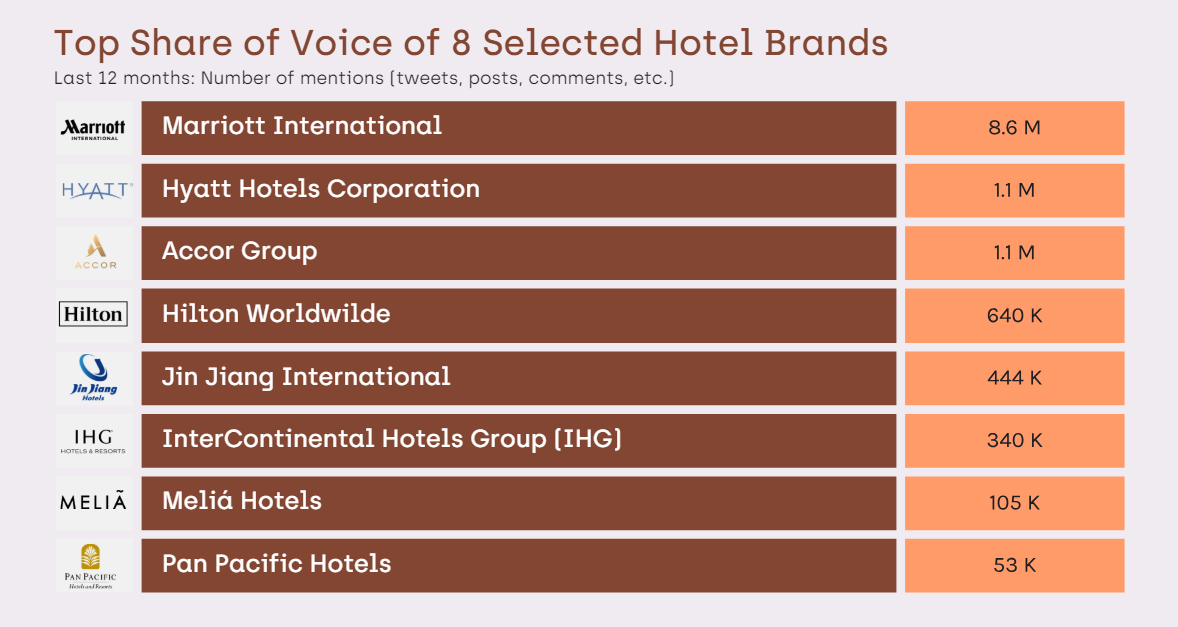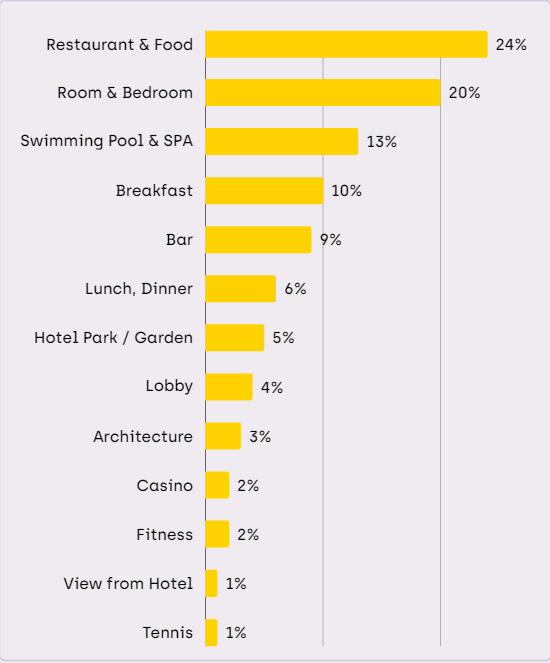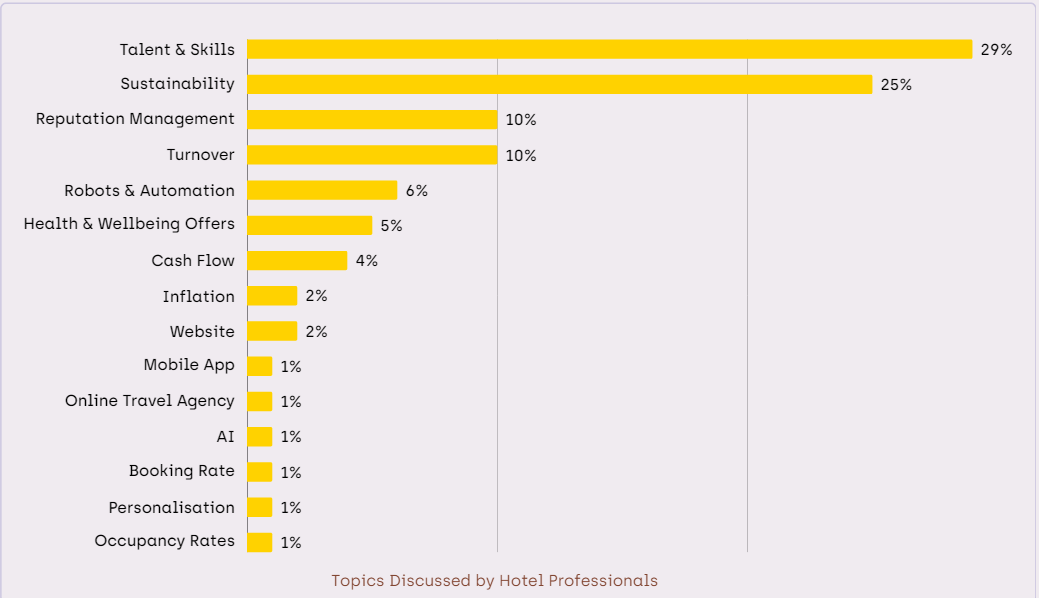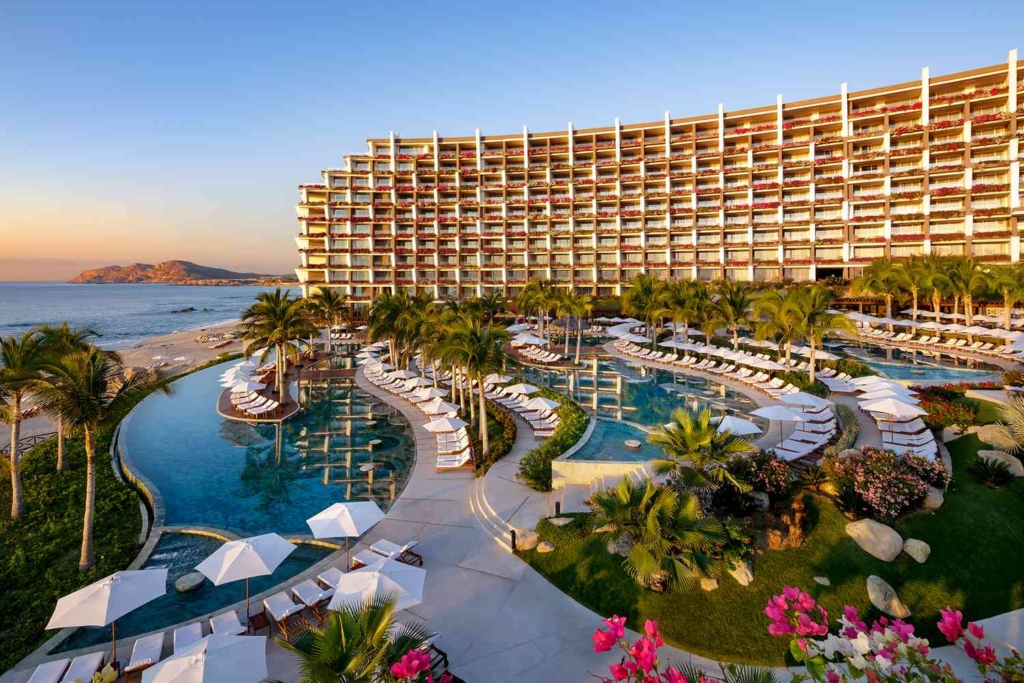The hotel industry has always been a fascinating space, constantly evolving to meet the needs and desires of guests. Hotel companies and brands have been significantly influenced by social media, with platforms like Instagram, X (formerly Twitter), and TikTok providing channels for hotels to engage with their audiences in new and unique ways. This shift has not only changed the way hotels market themselves but also how they understand and interact with their customers and the media.
We used social listening to analyse 8 leading hotel brands over 12 months to bring you valuable insights on what’s shaping the industry right now. The hotels and companies we analysed are:
- Marriott International
- Hyatt Hotels Corporation
- Accor Group
- Hilton Worldwide
- Jin Jiang International
- Intercontinental Hotels Group (IHG)
- Melia Hotels
- Pan Pacific Hotels
We also carried out an analysis of industry disruptor, Airbnb.
- Marriott International Dominates Social Media Share of Voice’

Last 12 months: Number of mentions (tweets, posts, comments, etc.)
Out of the eight hotel companies and brands we analysed, Marriott is the clear winner when it comes to garnering the most posts and comments. In terms of sales, Marriott International is way ahead of its competitors. This is mainly due to its large number of rooms (over 1.5 million) and its famous brands including Westin and Sheraton, which are the most frequently mentioned within its group. Marriott’s hotels in the USA and India have a particularly strong presence on social media – mainly photos and videos.
But industry disruptor, Airbnb, is hot on the heels of Marriot with over 5M social media mentions in the last 12 months, far surpassing the rest of the hotels in our list. While Marriott received over 40% more mentions, Airbnb is working hard to keep pace by winning the race with user-generated content. More on Airbnb in a moment . . .
- What do Hotel Customers Post on Social Media when Sharing Hotel Experiences?
Channels like X (formerly Twitter), review sites, and Facebook remain common channels for hotel industry guest complaints, but Instagram, Facebook, TikTok have emerged as hubs for guests, influencers, and celebrities to share visuals and reviews of their hotel stays.
Instagram reigns supreme among influencers, while Facebook and TikTok are favoured by regular customers. Instagram boasts the most elaborate and staged photos, often showcasing not just meals but also picturesque landscapes surrounding the hotels they’re staying in.
Influencers and bloggers accompany their posts with detailed reviews covering facilities, rooms, rates, food, service, and day-to-day experiences. Food-related content dominates, comprising nearly half of all shared photos and videos, followed by room/suite showcases, with luxury hotels and balcony views proving particularly popular – unsurprisingly.

The Most Popular Topics & Hashtags Published about Hotels
- What Concerns are Customers Voicing about the Hotel Industry on Social Media?
Our detailed analysis shows that customers’ primary concern with hotels revolves around high prices, particularly in relation to additional expenses like parking and room service, especially for short stays.
Bathrooms rank second in discussions, with cleanliness, water quality, toiletry dispensers, and towels often scrutinised in the context of environmental impact versus hotel pricing.
Cheaper hotel prices are the focus of conversations in fourth place, often in comparison to alternative accommodations like Airbnb, with some customers surprised to find Airbnb more expensive than hotels in some regions.

Concerns Discussed by Hotel Guests
You can delve into the details of concerns discussed by hotel guests in our Hotel Industry Scan report.
- What Topics is the Hotel Industry Talking about?
Hotel industry professionals continue to grapple with the impact of rising costs and a challenging economic climate, emphasising two main challenges: talent and skills, and sustainability.
The scarcity of skilled staff, exacerbated by a pandemic-induced employee exodus, tops discussions, with talent retention closely following. In high-cost tourist areas, accommodating staff affordably poses an additional hurdle.
On the sustainability front, the hotel industry is transitioning from rhetoric to action, implementing measures like bulk toiletry dispensers and improved waste recycling. Significant investments in energy-efficient construction and renovation projects, including rooftop solar panels and geothermal heating, highlight the commitment to environmental responsibility despite associated costs.

Topics Discussed by Hotel Professionals
- Airbnb’s Social Media Savviness gives the Hotel Industry a Run for its Money
Airbnb understands the world of social media and leans into it. It knows that whether it’s a vacation rental or a business trip, there’s always an experience to be shared.
Perhaps this explains the rise of ‘Only on Airbnb’ – unique experiences that tantalise even the biggest names like Elon Musk. Whether it’s Antoni Gaudí’s First House or the Barbie Dreamhouse, they’re money-can’t-buy-experiences, available at the click of a button, and shareable in an instant. ‘Only On Airbnb’ is identified as one of the main drivers of positive sentiment, leading to a net sentiment ranking far higher than its old school hotel chain competitors.
Emerging trends on TikTok include host videos about items left behind by guests and concerns about deposit returns, generating engaging user-generated content favoured by algorithms.
Vrbo, with less than 5% of Airbnb’s total share of voice, strategically inserts itself into conversations about Airbnb, predominantly through posts by rental space advertisers seeking broader audiences. Despite its smaller size, Vrbo demonstrates a clear ambition to compete closely with Airbnb.
The hotel industry has undergone significant transformations in the wake of the Covid-19 pandemic, compounded by escalating sustainability concerns and cost of living challenges. These issues reverberate across social media platforms such as Instagram, Facebook, and TikTok. At a time when engagement thrives on these platforms, hotel brands are compelled to embrace adaptability and innovation to uphold their competitiveness and relevance with their audiences.
Discover more 12-month insights about the nine hotel companies and brands we analysed in our Hotel Industry Scan report.
